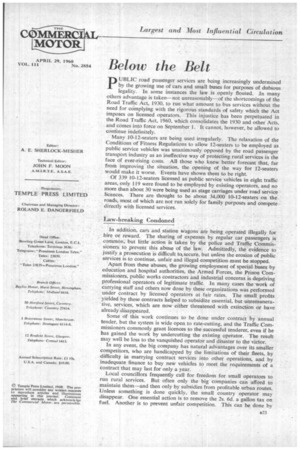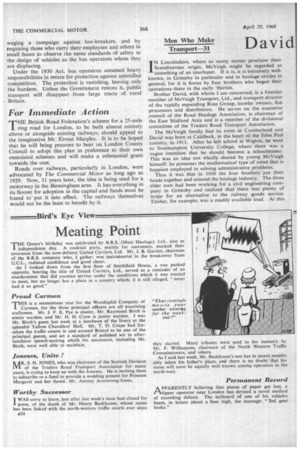Below the Belt
Page 29

Page 30

If you've noticed an error in this article please click here to report it so we can fix it.
pUBLIC road passenger services are being increasingly undermined by the growing use of cars and small buses for purposes of dubious legality. In some instances the law is openly flouted, in many others advantage is taken—not unreasonably—of the shortcomings of the Road Traffic Act, 1930, to run what amount to bus services without the need for complying with the rigorous standards of safety which the Act imposes on licensed operators. This injustice has been perpetuated in the Road Traffic Act, 1960, which consolidates the 1930 and other Acts, and comes into force on September 1. It cannot, however, be allowed to continue indefinitely.
Many 10-12-seaters are being used irregularly. The relaxation of the Conditions of Fitness Regulations to allow 12-seaters to be employed as public service vehicles was unanimously opposed by the road passenger transport industry as an ineffective way of protecting rural services in the face of ever-rising costs. All those who knew better forecast that, far from improving the situation, the opening of the way for 12-seaters would make it worse. Events have shown them to be right.
Of 339 10-12-seaters licensed as public service vehicles in eight traffic areas, only 119 were found to be employed by existing operators, and no more than about 30 were being used as stage carriages under road service licences. There are thought to be about 34,000 10-12-seaters on the roads, most of which are not run solely for family purposes and compete directly with licensed services.
Law-breaking Condoned
In addition, cars and station wagons are being operated illegally for hire or reward. The sharing of expenses by regular car passengers is coalition, but little action is taken by the police and Traffic Commissioners to prevent this abuse of the law. Admittedly, the evidence to justify a prosecution is difficult t. secure, but unless the erosion of public services is to continue, unfair and illegal competition must be stopped.
Apart from these abuses, the growing employment of special buses by education and hospital authorities, the Armed Forces, the Prison Commissioners, public works contractors and industrial concerns is depriving professional operators of legitimate traffic. In many cases the -work of carrying staff and others now done by these organizations was performed under contract by licensed operators at fair rates. The small profits yielded by these contracts helped to subsidize essential, but unremunerafive, services, which are now either threatened with extinction or have already disappeared.
Some of this work continues to be done under contract by annual tender, but the system is wide open to rate-cutting, and the Traffic Commissioners commonly grant licences to the successful tenderer, even if he has gained the work by undercutting the existing operator. The result may well be loss to the vanquished operator and disaster to the victor.
In any event, the big company has natural advantages over its smaller competitors, who are handicapped by the limitations of their fleets, by difficulty in marrying contract services into other operations, and by inadequate finance to buy new vehicles to meet the• requirements of a contract that may last for only a year.
Local councillors frequently call for freedom for small operators to run rural services. But often only the big companies can afford to maintain them—and then only by subsidies from profitable urban routes. Unless something is done quickly, the small country operator may disappear. One essential action is to remove the 2s. 6d. a gallon tax on fuel. Another is to prevent unfair competition. This can be done by waging a campaign against law-breakers, and by requiring those who carry their employees and others in small buses to observe the same standards of safety in the design of vehicles as the bus operators whom they are displacing.
Under the 1930 Act, bus operators assumed heavy responsibilities in return for protection against unbridled competition. The protection is vanishing, leaving only the burdens. Unless the Government restore it, public transport will disappear from large tracts of rural Britain.












































































































